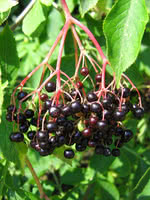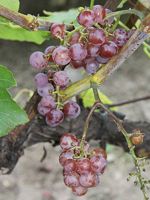Mon-Fri 9am - 5pm Mountain time
Black Elderberry vs Somerset Grape
Sambucus canadensis
Vitis Somerset
NOT AVAILABLE THIS SEASON - MIGHT RETURN
Black Elderberry is a deciduous shrub native to eastern North America. You can plant this shrub in moist areas and it will help stabilize your soil. You can also use it on rural properties anywhere you'd use a lilac.
Black Elderberries are considered to be partially self-pollinating. So while they will still produce some berries without cross-pollination, planting with another variety will increase yields. Consider planting with Ranch Elderberry or Bob Gordon Elderberry.
Warning: the seeds, stems, leaves, roots, and uncooked berries of the Black Elderberry are poisonous to humans when eaten in quantity. You should cook the berries to make them safe for human consumption.
The Somerset Grape is a cold-hardy variety that is sweet, with a hint of a strawberry taste and tender skin, making them excellent for fresh eating. The grapes grow throughout the summer and go from a light pink and deepen in color as they ripen. The grapes will be at their peak sweetness in mid to late September, making that the best time for harvest.
The Somerset Grape is considered a seedless variety. Occasionally the fruit will contain seeds, but they are soft and barely noticeable. The grapes themselves are a bit smaller than the average size you’d find in the grocery store, however the cluster is compact and quite big. This vine is best supported with a trellis.
Note: We do not ship grape vines to BC due to regulatory restrictions from the Canadian Food Inspection Agency.
Black Elderberry Quick Facts
Somerset Grape Quick Facts
Toxicity: leaves, stems, and uncooked berries are poisonous to humans

